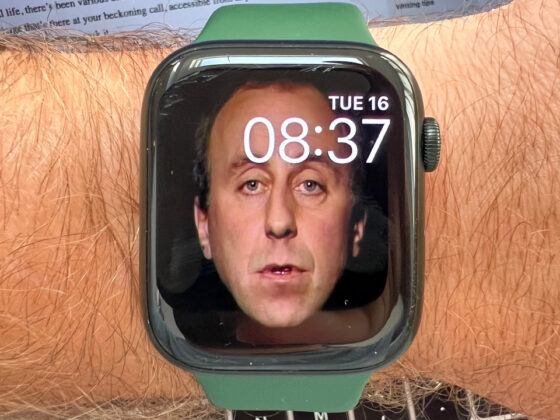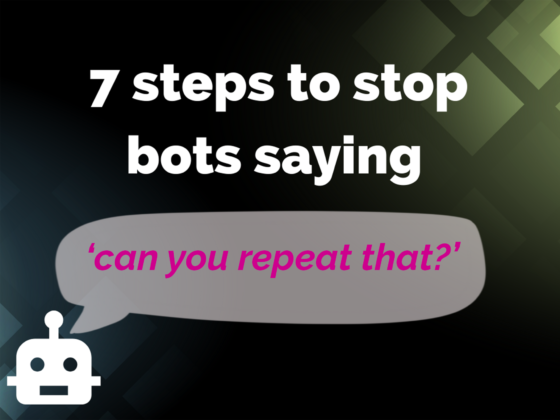So, here we are. The end of 2019. And it’s time for some click bait regarding 2020 voice-first industry predictions.
I told you to prepare for this a few weeks back.
While forecasting can be inspiring and encouraging, it could also be perceived as a holding message.
It’d be easy to hear about how advertising will come to smart speakers in 2020 and think “I’ll wait for that, then I’ll do something”.
Or read about 5G rolling out in the next 12 months and think “I’ll hang on until then”.
Or, maybe you’ll read how the voice mega-trend will cause a back-to-basics review of existing content, worry about how much work that’ll be and kick the can down the street.
Perhaps you’ll hear buzzwords like the importance of ‘compatibility and integration‘ and how ‘environment and context data‘ is key to enabling ‘transaction-oriented consumer intents’ in 2020, glaze over and think “this is just too complex”.
I have no problem with these kind of articles per se. I’ve enjoyed reading some of them. Especially this one from RAIN, this one from Vixen Labs and this one from Rabbit and Pork.
I just think they can often contain hopes and wishes or general, broad trends, rather than sober predictions of what might actually happen in the next 12 months.
And much of this stuff was predicted last year as well. Siri to open up third party development, anyone?
“There isn’t much in those predictions that wouldn’t have been suggested this time last year.”
David Low, Executive Product Manager, Voice and AI, BBC, incoming CEO, The List
While it’s nice to look forward, hope, predict or wish; critical even. It’s also good to understand what you should realistically do in 2020 if we continue to have another iterative year.
And much of this stuff was predicted last year as well. Siri to open up third party development, anyone? Click To Tweet2020: another iterative year for voice
Perhaps a not so bold prediction (or a bolder prediction), which I subscribe to, is that 2020 will be an iterative year for voice assistants.
That might not be what you want to hear. But think about it. Think about some of the main challenges, like discoverability.
If it was easy to solve, it would have been solved already.
The big players could do something radical to address it, but what are the chances of that? It’s too risky.
The big players could do something radical to address it, but what are the chances of that? It's too risky. Click To TweetIn reality, they’ll iterate towards solving these problems over time.
That’s because to address something like discoverability, you need to address the current set-up of the platforms, challenge our app-centric mental modal and really consider whether skills are the right solution.
Amazon have far too much invested in skills and too much smart speaker penetration to risk confusing the message or pivoting in a big way. At least not over the next 12 months.
The only platform I could ever see pivoting from the app-centric mental model is Google which, to be honest, already has. Actions aren’t just ‘apps’, anything Google Assistant can do is an action, including performing a web search. That’s how Google can claim to have over a million actions.
Further iteration isn’t really a bad thing
Maybe that’s not such a great prediction for a rapidly evolving space. But so what?
I don’t know why everyone’s obsessed with ‘rapidly evolving’ things anyway. The pace of technological advancement is obviously quick (and quickening), but user behaviour doesn’t change at anywhere near the same pace.
The pace of technological advancement is obviously quick (and quickening), but user behaviour doesn’t change at anywhere near the same pace. Click To TweetPeople will change their habits from screens to speaking, for the right kind of things, over time. People won’t break out of 15 years worth of mobile conditioning or 20+ years of screen-based, keyboard conditioning in the next 12 months.
The reality is, the platforms are already capable of more than people are using them for. It’s the advancement of user behaviour that we should concentrate on.
What the voice industry should do in the next 12 months
What should happen in the next 12 months is that all of us in the industry should be doing the best work we possibly can, within the areas we can affect and influence, to give users the best possible experiences that increase their confidence and trust in voice assistants and voice interfaces.
Whether that’s putting voice search into your app, building an Alexa skill, putting a voice bot on your website, wherever it makes sense for your users. The main thing should be to provide quality, reliable experiences that do the job they need to, well, and consistently, and give users confidence in the medium.
But, you don't need to start big, you just need to start. Don't get caught short like you did with mobile and social. Click To TweetConfidence that’ll build over time.
Confidence that’ll turn into repeat usage, over time.
Confidence that will lead to bigger behavioural changes and unlock this door we’ve been banging on for the last few years.
And for brands, just start. Move the needle. Get off the starting blocks. Just. Move.
With smartspeaker penetration being over 20% in the UK and usage rising, reaching your target market with something they value is a real proposition. And that won’t happen on its own.
Maybe no one in your industry has done it yet. Maybe there aren’t any case studies for you to compare.
But, you don’t need to start big, you just need to start. Don’t get caught short like you did with mobile and social.
We already have the tools. We just need to actually use them
Merry Christmas and all the best for a VUXing epic New Year.




